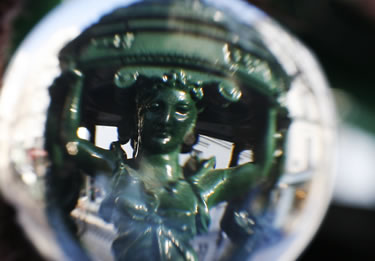|
|||

Ceres Ceres in Planet Wiki Research Notes ONE IS officially named for a traditional goddess (Ceres, the Roman goddess of fertility, whose domain includes food, grain, nourishment, mothers and the pain they endure around their children). Ceres made her appearance in 1801, at the dawn of the industrial age, and was in a sense the harbinger of such changes as mass-scale agriculture. Discovered by the Sicilian astronomer Giuseppe Piazzi, she was named for one of the patron goddesses of the island. She represents the qualities of nurturance and nourishment, describing both how we were nourished as a child and the ways we nourish others as adults. Ceres often provides a meaningful commentary on the qualities of one's mother and one's tendencies as a mother. But the literal association with grains and food cannot be overlooked. Today, the world still survives principally on wheat, rice and corn. Of note, Ceres was discovered the day that the modern United Kingdom was born, Jan. 1, 1801, the day the Act of Union took effect.” Ceres is the root of the word cereal; she is the goddess of food and agriculture. In astrological delineation, we can look to her for very specific information about matters relating to food and nurturing, and where the two meet. She can represent the quality of nurturing we got as a child, and how we function (or don't) as nurturers in our relationships. Before moving onto Pluto, it is very, very well worth noting that on New Year's Day 1801, two hundred years ago, a new kind of planet was discovered. This was Ceres, the first asteroid. Ceres was the second planet ever named for a woman and the first new planet named for a woman; and of course, she was "not a planet." Planets were only the big things going deeper and deeper into space. Ceres is the Roman name of the Greek goddess of agriculture, Demeter; she is about the Earth and its fruits, grains (hence "cereal") and the guardian of marriage. In discovering Ceres, not counting her for a planet (an issue for both astrologers and astronomers), and then abandoning her, we seemed to be reflecting a cultural process that would, in a very short time, foul the nest known as Earth and lead to many generations of failure to honor relationships, nutrition and nurturing one another. But Ceres has an added dimension, since her daughter, Persephone, was abducted by Pluto, which grieved her terribly. Ceres represents subject matter that surrounds the mother's (or primary nurturing parent's) grief and fears about children, particularly those who are taken to the underworld of crime, prison, drugs, or lost to dark parents. With millions of people unjustly in our prisons today, we have a very important planet and mythological reference to work with. In terms of agriculture, we are in critical times as well. We are seeing the seizure of the life force by companies which create chemically-sprayed and genetically-modified foods; and at the same time, we're seeing a significant interest in organic and Biodynamic foods, in a struggle that feels a lot like the daughter of nature struggling for her freedom from the corporate underworld. Ceres is Mother Earth. |
